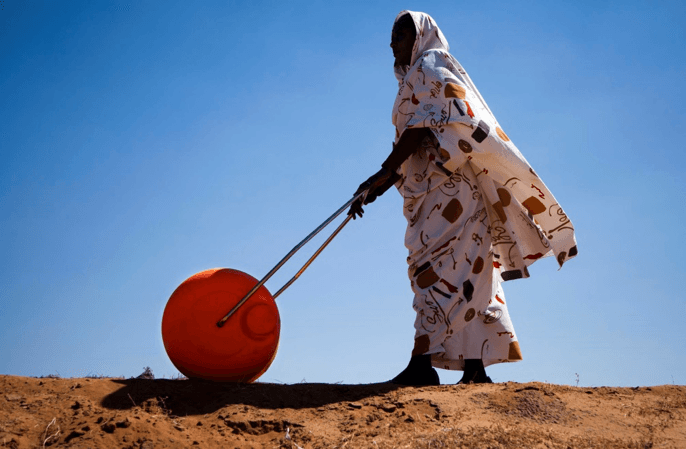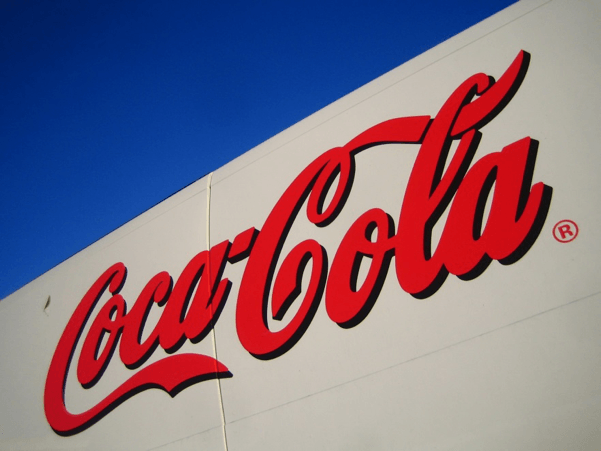
Pictured is a Darfurian woman using a water roller to bring water back to her household from a well Courtesy of UNAMID ©️2011 http://tinyurl.com/lb6wqsj
We all know that water is essential for life. Living in a developed country, many may forget how challenging it is for some to obtain sufficient amounts of water daily. In states in sub-Saharan Africa, access to clean water is limited. Trekking out to a clean water source is a job passed onto women and children, especially young girls, leading to a gap in education. According to the State Department, 800 million people globally, approximately two and one half times the population of the United States, are lacking accesses to clean water. The Department of State is not doing enough to promote programs that fund clean water initiatives and should be doing more. The advantages of doing so would help promote American interests abroad in states that are currently not receptive to western influence. In this blog, I will lay out a public diplomacy strategy that the State Department should take to promote clean water programs, and how said clean water programs will help the State Department build relations with states negati
vely affected by the water crisis.
Currently, the State Department has one active clean water program listed on its website, and it is with the People’s Republic of China. The program is run interdepartmentally with the Environmental Protection Agency and the Manufacturing Engineering Partnership, which is a part of the National Institute of Standards and Technology. The ten-year project is meant to be a mutually beneficial learning experience for both the United States andChina; to learn how to keep water sources clean and deliver it to communities effectively. This program is not enough, however.

One of the biggest players in the clean water game is the Coca-Cola Company. Through their initiative, they have 248 projects in 71 countries. But have you e
ver heard about these accomplishments? Probably not. But now, aren’t you more likely to purchase a Coca-Cola product after learning that? Executives at Coca-Cola must have decided that their domestic marketing money is better spent advertising their products rather than their philanthropic accomplishments.
The programs that Coca-Cola have in place generate good will both locally and globally. Coco-Cola even posted a self-critical article on their blog, Unbottled. The mere fact that the company posted about how they are viewed critically on a website designed to be viewed by investors signals that they are interested in helping the issue.
The State Department needs to think of itself the way Coca-Cola does, focus on building good will and being at the front of the mind when one thinks “helping other states.” How could the United States government go about doing this? Securing funding would be difficult, especially given the fact that soft power initiatives have always been relatively unpopular in the U.S. The best way to go about promulgating clean water initiatives is to reach out to the biggest player and offer them what they don’t have, access and . The State Department has the ability to work in concert with foreign governments to get programs—like clean water—off the ground.
Coca-Cola does not have the power of the United States government behind them, even though they are a very large company. But they do have the money ad ability to spend that the State Department does not have. The match is seemingly perfect.

What does the Coca-Cola Company stand to gain from a partnership with the State Department? Publicity and positive messaging for their corporation. The State Department should hold competitions domestically to come up with ideas for names for this clean water initiative, and while doing so, make the Coca-Cola brand front and center. Many people will be exposed to this advertising, giving Coca-Cola an incentive to play ball. Plus, Coca-Cola has partnered with institutions on public diplomacy programs in the past, like this one inviting several Chinese students to learn U.S. foreign policy.
What programs can result from a partnership between Coca-Cola and the State Department? The State Department offers convening power while a large corporation like Coca-Cola offers money. One program that the two could partner on would be a multiplatform marketing campaign internationally urging people to donate to clean water funds. Coca-Cola would be able to fund such an effort while the State Department would be able to reach a wide audience internationally through its embassies and connections abroad. This program would signal to a foreign audience that the United States cares about those who face water insecurity.
Another possible program could be a competition among university students in the United States to come up with infrastructure solutions to the water crisis abroad. The incentive for the student to participate would be a scholarship provided by Coca-Cola or another large corporation. The State Department would judge the contest and implement the best solution from it based on which entry would be the most viable. This program would crowdsource some of the best minds in the United States to work on a solution. It would also promote the United States abroad by showing that young people are invested in helping the world.
Lastly, the State Department and Coca-Cola could take Coca-Cola’s money and distribute it to various clean water charities and NGOs to help fight the water crisis. This solution would offer Coca-Cola to have its name all over the projects and the State Department could use this opportunity to build relationships with NGOs that it might not be close with. This solution, while not the most creative, would provide for the advancement of promoting the United States to foreign audiences while helping people around the world who need clean water.
Of course, the corporation in question does not have to be Coca-Cola, and the State Department would have to open this partnership opportunity to everyone, including competitors such as PepsiCo (who do have a clean water program, but provide less information about it than Coca-Cola Co.). I have used Coca-Cola as the example in this blog because they are one of the biggest corporations that have expressed interest in the clean water issue.
The most important thing that the State Department can do is promote this issue. There is not enough coverage on this issue in the news because the agenda-setters have not called any attention to it. This issue is so important that a woman was willing to attempt to walk 12,000 kilometers across the African continent to raise awareness for the clean water issue. The only coverage it got was on Voice of America, The Huffington Post (for which she was a writer), and her hometown news affiliate. The Department of State partnering with a large corporation like Coca-Cola can bring eyeballs and pocketbooks to the issue of clean water funding.

I think that this blog had an interesting connection between State Department programs and private corporations (Coca Cola) to help combat the issue of the lack of clean water. I also found it interesting that a program idea could start on college campuses. I think this article about Arizona State University funded program will be helpful for this topic: https://asunow.asu.edu/20170111-arizona-state-university-and-partners-bring-clean-water-middle-east-communities
It would be interesting to comment a bit more on how the State Department could specifically use these programs to further other policy goals – such as what the U.S. has to gain from closing the education gap in developing countries. From my own bit of research, it seems that the U.S. could stain to increase its overall popularity with a government-funded effort in these developing countries, but perhaps the state department feels that they need more concrete reason to spend government funds on such programs. https://www.brookings.edu/blog/techtank/2016/08/23/classroom-technologies-narrow-education-gap-in-developing-countries/
I really enjoyed this – I think there needs to be more discussion of the role that private financing can play in environmental efforts globally. I do have a few thoughts, though. First, I don’t think it’s fair to say that the US government’s efforts in the area of clean water are limited to the program with China – USAID has a huge number of initiatives around the world and the government works with a large number of NGOs. That being said, I agree that every part of the government should make this a priority, particularly due to its relation to countering violent extremism efforts. Lack of access to clean water (often caused by extreme weather events / droughts brought by climate change) is a huge contributor to poverty and, consequentially, recruitment for extremist groups all over the world. Check out this article: https://www.vice.com/en_us/article/is-water-scarcity-radicalizing-the-middle-east-235
I think this post in combination with Alexa’s comment goes to show that even when the United States Government is doing something, it is very bad at publicizing it. There is no reason why the State Department can’t throw a “shout-out” to USAID on their website about USAID’s clean water campaigns. This type of interagency cooperation is good for the standing of the United States. Clean water is the first step of the battle. Access to clean water leads to access to nutritious food, which leads to access to quality education. The Department of State cares about all of these issues and a tab on it’s website or a social media campaign about the intersectionality of all of these issues can do nothing but help.
I really like the perspective that you have taken here. The ways that you have suggested the campaign grow are interesting ways to best use the power both Coca-Cola and the State Dept. have. It would be interesting to know what ways you think the partnership could utilize social media and ad campaigns to advance its cause. Though discussing ways that PD can be more engaging, I think that Jenna’s blog provides some interesting ways to get audiences involved in a movement https://takefiveblog.org/2017/04/12/publicdiplomacy-creating-social-media-movements-to-make-government-initiatives-more-engaging/.
I think this topic is well-chosen. I would be careful when discussing Coca-Cola’s private-public partnerships as a success story. While in India, the village that I was working in was compromised by Coca-Cola rerouting their water supply to make beverages that the people could not afford to buy. This is a very tricky partnership that has a very slippery slope. Moreover, the Coca-Cola’s 5 by 20 campaign is failing with no statistical outline to measure ‘empowerment’. Here is a link to the CEO of Coca-Cola talking to Charlie Rose- it’s ‘model water distribution center’ is clearly a flawed and oversimplified version of the realities that Sub-Saharan African countries face: https://charlierose.com/videos/17226. This video clearly indicated that it would be an embarrassment for the U.S. State Department to partner with Coca-Cola.
Rob,
It was a pleasure reading your informative blog. I think working with other countries and in the private sector on the issue of clean water should be a priority and you really brought good research and insight into the topic. Another country that the U.S. could absolutely work with on clean water access could be Israel, who have been a world leader on the subject, developing drip irrigation and world-class desalination systems. To read more check out this summary: http://oecdobserver.org/news/fullstory.php/aid/4819/Israel:_Innovations_overcoming_water_scarcity.html
Rob, thank you for your informative and interesting blog on the topic of clean water and how the State Department can make it a priority to work with other countries and the private sector. I think another country the U.S. could work with would be Israel, who has been a world leaders on the matter and developed innovative practices such as drip irrigation and desalination measures. For more information check out this OECD summary: http://oecdobserver.org/news/fullstory.php/aid/4819/Israel:_Innovations_overcoming_water_scarcity.html
I agree that US State Department should be doing more in terms of providing water for those in need. It is a great way to build lasting relations between countries. However, it should be noted that the State Department works in conjunction with USAID by aiding efforts to provide access to clean water. You can find more about their initiated at: https://diplomacy.state.gov/discoverdiplomacy/docs/206366.htm